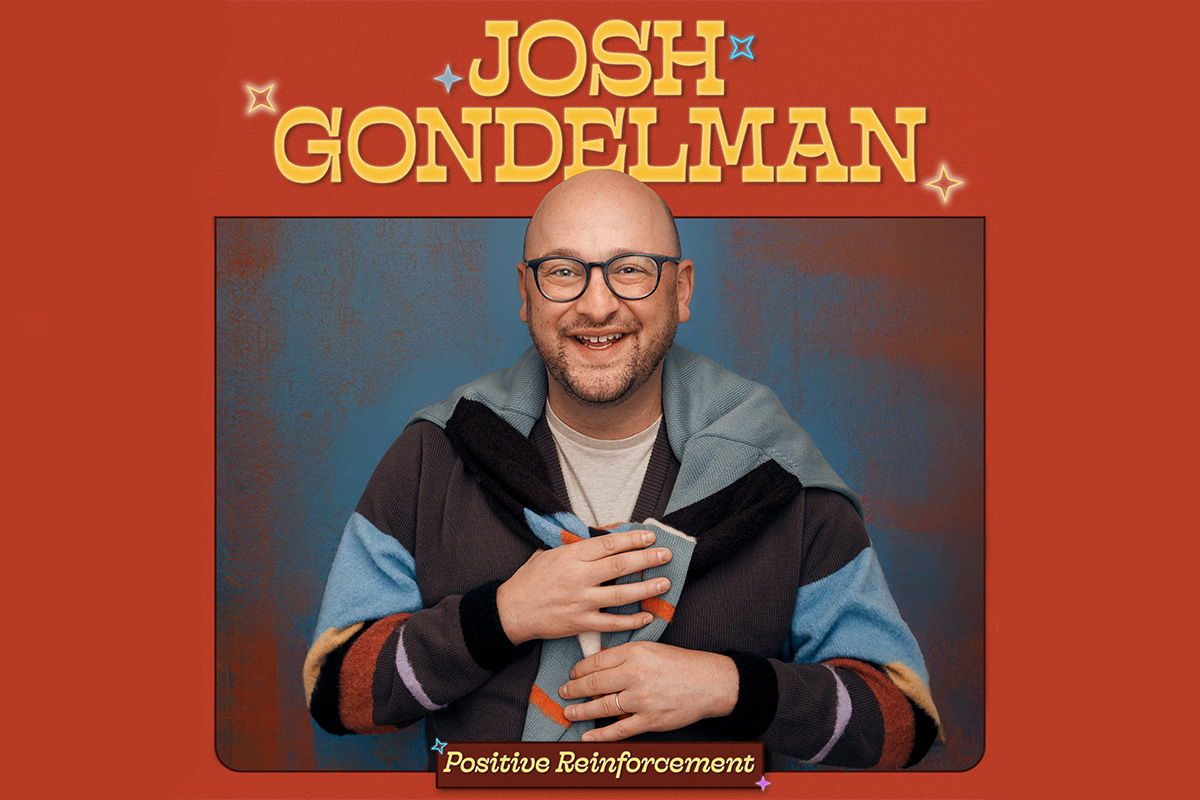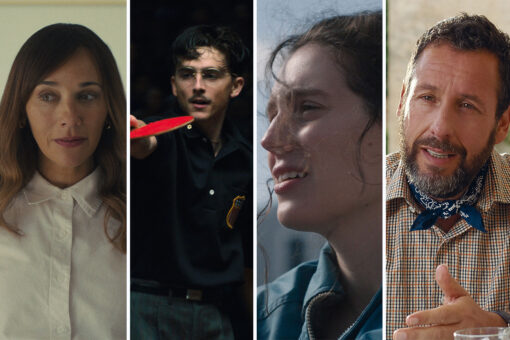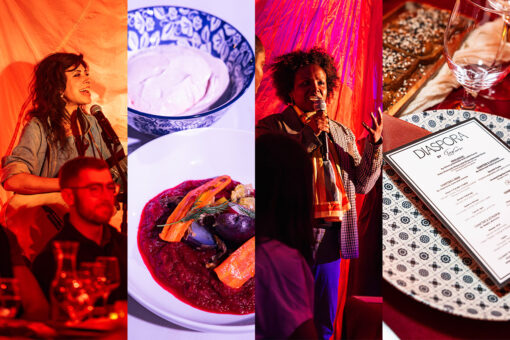Josh Gondelman loves positive reinforcement.
In the 40-year-old Jewish comedian’s new special, “Positive Reinforcement,” he begins by telling the audience that he’s a friendly guy (though, according to him, “it rarely helps”) who drunk texts his friends about how much he cherishes them as individuals. He goes on to talk about dating women in his 20s who wanted demeaning dirty talk in bed. It was a concept so out of character for him, he jokes, that he only allowed himself to do it compliment sandwich-style. “I’m at my best when I get to give positive reinforcement,” he explains. “So my dirty talk just came out unhinged every time. It was always like, ‘Ugh, you’re so hot, and you’re a nasty little slut… who shows tremendous attention to detail.”
It only makes sense to send some positive reinforcement right back at him.
“Positive Reinforcement,” which came out last week on YouTube, showcases Josh Gondelman at his best. It highlights his mastery of what I can only describe as soft-edged Jewish comedy. Don’t mistake this to mean his jokes aren’t written with expertly-honed precision — Gondelman has three Emmys from working on “Last Week Tonight with John Oliver” for a reason.
Instead, I mean that Gondelman isn’t ever going to be in-your-face with his sets, which often touch on Jewish identity. Rather, he’s gentle. His jokes will sometimes get a little dark, like all good Jewish humor does, but it’s always buoyed by Gondelman’s deeply endearing stage presence. There will rarely be a moment where Gondelman delivers a joke that he doesn’t clearly love, somehow finding a way to mutedly chuckle at his own punchlines in a way that isn’t conceited. He’ll even laugh when he’s making fun of himself, managing to poke fun without being stereotypically nebbische or burdensome to the audience.
It’s through this unusual technique (when’s the last time you watched a comedian and thought they were a sweetie pie?), that Gondelman skillfully softens any unease an audience might feel when he talks about weightier topics. In “Positive Reinforcement,” Gondelman tackles subjects like Burger King’s thoughts on abortion, an ex coming out as trans and even Israel and antisemitism.
I caught up with Josh a few weeks ago to talk about his new comedy special, listening to Adam Sandler tapes in the woods and the Jewish comedy elephant in the room.
This conversation has been lightly edited and condensed for clarity.
Congrats on the special! It’s so, so fun. I want to start with the first mention of Jewishness. It’s very early on with the set up, “Antisemitism is in the news.” I think it’s so telling of where we are in this political moment that the audience laughed in discomfort even before the punchline of you saying you don’t get offended when people criticize Israel, but you get super hurt when people criticize Adam Sandler. How do you deal with being on stage and talking about Jewishness and the audience doesn’t respond in a way that you kind of expect them to?
I mean, that was a very funny reaction. I tried to be really present with the audience in the moment. Hence my saying, “That’s not when you’re supposed to laugh at that.” I don’t get so deep or presume so much knowledge that I’m usually leaving people behind. But it is an interesting thing where outside of New York, people can find [Jewishness] more novel. Not everywhere. But there are some places you go where you can get a laugh just by going, like, “I have this different cultural context than you.” Most times because people are like, “Yep, sure, we don’t know that.” But I do try to really be present with the audience and feel out like, is this not something you have experience with that you’re reacting this way? Why? And I don’t set out to do a lot of crowd work, but I do sometimes do a kind of census taking.
Did you have any hesitancy about doing that bit, bringing up antisemitism and Israel and Netanyahu so close to the top of the show? Or at all?
No, I know that that joke plays. I knew that when I was touring this, that that bit played – the stuff about the Olive Garden and Adam Sandler and antisemitism, that all kind of feels like one chunk to me of talking about brands expressing political opinions and who’s speaking out about what. I did think about it in terms of, like, what I would say if we had pitched it to a streamer that was like, we want it, but will you have to cut that part out? And I did kind of think about, what is the principle here? How much do I stand on principle, and how much do I make that edit like I would a different edit, you know? I think there are places in which I’m more willing to take feedback and make edits because it doesn’t feel as close to my heart.
Well I am so glad that you didn’t have to ultimately make that decision. It’s such a funny joke, and I love that you end singing the opening notes of “Tradition” and then say, “Zero to Tevye in one second, that’s what you do to me.”
One of them was truly an ad-lib. But I asked my director and EPs, I was like, “Is it too much to have two ‘Fiddler’ references in this hour?”
More is more, I say. But OK, I have to ask now: What are your top three Adam Sandler films?
Oh, this is such a good question. I think “Punch-Drunk Love” for the one dramatic movie. I think “Happy Gilmore” is up in the top three. “Happy Gilmore” and “Billy Madison” occupy a similar place in my heart. I’m trying to think of another era of Sandler that I would like to represent… Hold on, I’m gonna pull up his IMDb. Oh, OK, I’m gonna go a little bit off the menu.
Please do.
I’m going to go with his first Netflix special, “100% FRESH.” I also have to give a special shout out to his albums. My friends and I had his comedy albums when we were way too young and they were so dirty. We’d seen the movies, which were PG-13 and him on SNL, and then we got these filthy comedy albums. My friends and I were, like, probably 10-12 years old. And we would have to listen to them in the woods on a boombox so no grown-ups would hear them. And one by one, all of my friends who had bought them or received them as gifts had them confiscated by parents because they were so so dirty. It was like an extremely formative comedy part of my youth.
I love a comedy album. My dad had Mel Brooks records and would play them for my sister and I when we were kind of too young. I have such nostalgia for that. We would just repeat “There’s something bigger than Phil” to each other over and over again.
Is that from the “2000 Year Old Man”?
Yeah.
Yeah, I had those. Those Mel Brooks albums were huge for me. I really love comedy records. I’m so excited that the special is coming out in audio form as well. It’s slightly extended with a couple jokes from the taping that I felt fit in the flow of the audio media more than video.
I love that. Did Adam Sandler or Jewishness influence you getting into comedy?
I think Jewishness really did. Adam Sandler was part of that and Mel Brooks, too.
I just like this idea of ways that Jewish people could move culture and participate in culture at this level of like… Mel Brooks is cool, but he’s not cool cool. You know? There’s something about an authentic way of engaging with culture and creating culture that feels Jewish and compelling, without feeling like you have to do the poses of someone else’s culture to be interesting. I say that at the same time that The Beastie Boys were kind of forced into hip hop culture. But just seeing the way that they evolved as artists and people over the years, and realizing that, oh, you can grow up and still be fun and funny and find your own way, instead of just doing the moves. I think that that has always been really influential to me, this kind authenticity, and not having to pretend you’re a different way than you are, and still getting to engage and be a part of broader popular culture. And, you know, it didn’t hurt that Mel Brooks got to kiss pretty women and showed that you can be like that. Like, you can be two feet tall and funny and magnanimous and that goes far. Like, thank God.
Your version of Jewish comedy is one that I haven’t really seen before. Part of your persona onstage is being one of the most friendly guys that could be. And after I watched your special, I was like… I don’t often think of Jewish humor as friendly. Not that it’s mean, I just don’t know if I’ve ever seen it be friendly.
I think the kind of Jewish comedy elephant in the room that has gone unmentioned is Woody Allen, who was also very formative for me when I was a young person. But I think like there was a misanthropy to Woody Allen, that is also present in a different way in Larry David and present in a different way still in Jerry Seinfeld. And so we’re talking about three of the most influential Jewish comedians and comedy writers of a 50-year span. Early on, I was very influenced by his kind of *makes nebbische sound*. Something that I’ve tried to be much better about as I’ve gotten older and more skilled at comedy and more certain of who I am as a person is being confidently gentle as opposed to being self-effacing. And I appreciate you clocking that subtle difference.
Does softness and Jewish comedy, or even comedy, ever feel at odds with one another for you?
It took a while for me to get to this trajectory as a performer. I think part of it was that, for a while, there weren’t a ton of models for it. Now there are more. When I started comedy in like, 2004 it was a more uniformly boisterous time in comedy. Dane Cook was one of the biggest names going and he was so energetic and so goyische. Gary Gulman was on “Last Comic Standing,” and I would see him and be like, that’s the guy. Right? And now there are people that have a little more softness and tenderness on stage. There’s Maria Bamford who has a real vulnerability, and Joe Pera and Mike Birbiglia. It’s all different ways of being comedically strong and sturdy while not being aggressive towards the audience in your persona.
OK, one last question. One of your jokes is about how you’re a member of the LGBTQ+ community on a technicality. (I won’t ruin the joke for readers.) So how did you celebrate Pride?
That’s really funny. My friend Erin Judge and her friend Tina Romero co-wrote this really wonderful zombie drag queen movie called “Queens of the Dead” and Tina directed it. I went to see it at Tribeca, and it was a very queer audience. It was just such a blast. I was so thrilled to have gotten to see, I think, the third-ever public screening.
And then the other thing was, I went down to D.C. at the very end of May — so not Pride yet, but it was May 31.
Erev Pride.
Yes, exactly. I was there for this largely trans music festival called Liberation Weekend, and it was to benefit the Gender Liberation Movement. I co-emceed one of the last shows with my friend Mattie Lubchansky and our other friend Rax King. And I felt very honored to be invited into this very queer space as a friend of the movement or whatever. It meant a lot to me to be there in solidarity and support. It’s really miserable and vicious the way trans people and queer people are being treated by this administration. To show up and be like, “I’m here with you all like this,” I don’t know that it moves the needle. But I think physically showing up and like being there with people is the kind of baseline of what we owe each other.
I love that you turned my silly question into a genuinely touching response.
I’ve really been thinking about what kinds of solidarity people can offer one another, and what the Jewish obligation is. It’s like Hillel says: If I am not for myself, who is for me? When I am for myself, what am I? If not now, when? If that’s all that you get from religion, that’s such a beautiful direction to put your life in. I think when you have the physical means and the cultural, societal privilege to show up whether it’s for solidarity with immigrants and refugees and trans people and Palestinians, I think that is such a worthwhile imperative as a person.



